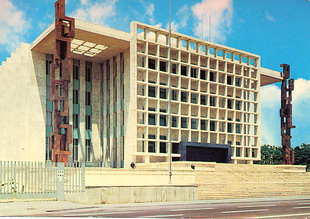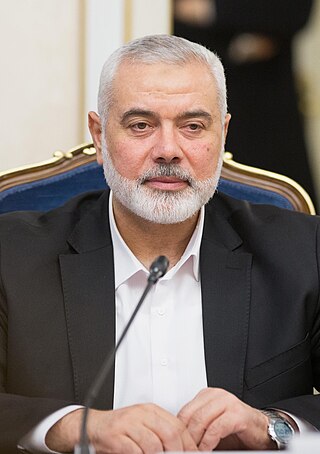| |||||
| Decades: | |||||
|---|---|---|---|---|---|
| See also: | Other events of 1963 Years in Iran | ||||
Events from the year 1963 in Iran.
| |||||
| Decades: | |||||
|---|---|---|---|---|---|
| See also: | Other events of 1963 Years in Iran | ||||
Events from the year 1963 in Iran.

Iran, officially the Islamic Republic of Iran (IRI), also known as Persia, is a country in West Asia. It borders Turkey to the northwest and Iraq to the west, Azerbaijan, Armenia, the Caspian Sea, and Turkmenistan to the north, Afghanistan to the east, Pakistan to the southeast, the Gulf of Oman and the Persian Gulf to the south. With a mostly Persian-ethnic population of almost 90 million in an area of 1,648,195 km2 (636,372 sq mi), Iran ranks 17th globally in both geographic size and population. It is the sixth-largest country entirely in Asia and one of the world's most mountainous countries. Officially an Islamic republic, Iran has a Muslim-majority population. The country is divided into five regions with 31 provinces. Tehran is the nation's capital, largest city and financial center.

The Iran–Contra affair, often referred to as the Iran–Contra scandal and more rarely as the Iran Initiative, was a political scandal in the United States that occurred during the second term of the Reagan administration. Between 1981 and 1986, senior administration officials secretly facilitated the illegal sale of arms to Iran, which was subject to an arms embargo at the time. The administration hoped to use the proceeds of the arms sale to fund the Contras, an anti-Sandinista rebel group in Nicaragua. Under the Boland Amendment, further funding of the Contras by legislative appropriations was prohibited by Congress, but the Reagan administration figured out a loophole by secretively using non-appropriated funds instead.

Ruhollah Musavi Khomeini was an Iranian Islamic revolutionary, politician, and religious leader who served as the first Supreme Leader of Iran from 1979 until his death in 1989. He was the founder of the Islamic Republic of Iran and the main leader of the Iranian Revolution, which overthrew Mohammad Reza Pahlavi and ended the Iranian monarchy.

Saddam Hussein was an Iraqi politician and revolutionary who served as the fifth president of Iraq from 1979 to 2003. He also served as prime minister of Iraq from 1979 to 1991 and later from 1994 to 2003. He was a leading member of the revolutionary Arab Socialist Ba'ath Party and later its Iraqi regional branch. Ideologically, he espoused Ba'athism, a mix of Arab nationalism and Arab socialism, while the policies and political ideas he championed are collectively known as Saddamism.

Tehran is the capital and largest city of Iran and also the largest city in Tehran Province. It also serves as the capital of the Province, county and the Central District. With a population of around 9.4 million in the city, and 16.8 million in the metropolitan area, Tehran is the most populous city in Iran and Western Asia, the second-largest metropolitan area in the Middle East after Cairo, and the 24th most populous metropolitan area in the world. Greater Tehran includes several municipalities, including "New Town of Andisheh", "Islam Shahr", "Qods", "Shahryar", "Pakdasht" and "Shamiran".
The Iran national football team, recognised by FIFA as IR Iran, represents Iran in international senior football and is governed by the Football Federation Islamic Republic of Iran (IRI).

The Iranian Revolution, also known as the 1979 Revolution, or the Islamic Revolution, was a series of events that culminated in the overthrow of the Pahlavi dynasty in 1979. The revolution led to the replacement of the Imperial State of Iran by the present-day Islamic Republic of Iran, as the monarchical government of Mohammad Reza Pahlavi was superseded by the theocratic Ayatollah Ruhollah Khomeini, a religious cleric who had headed one of the rebel factions. The ousting of Pahlavi, the last Shah of Iran, formally marked the end of Iran's historical monarchy.

The White Revolution or the Shah and People Revolution was a far-reaching series of reforms resulting in aggressive modernization in the Imperial State of Iran launched on 26 January 1963 by the Shah, Mohammad Reza Pahlavi, which lasted until 1979. The reforms resulted in a great redistribution of wealth to Iran's working class, explosive economic growth in subsequent decades, rapid urbanization, and deconstruction of Iran's feudalist customs.

Seyyed Ali Hosseini Khamenei is an Iranian Twelver Shia marja' and politician who has served as the second Supreme Leader of Iran since 1989. He previously served as the third president of Iran from 1981 to 1989. Khamenei's 35-year-long rule makes him the longest-serving head of state in the Middle East, as well as the second-longest-serving Iranian leader of the last century after Shah Mohammad Reza Pahlavi.

The AFC Champions League Elite is an annual continental club football competition organised by the Asian Football Confederation, and contested by Asia's top-division football clubs. It is the most prestigious club competition in Asian football, played by the national league champions of their national associations.
The Syria national football team represents Syria in international football, and is controlled by the Syrian Arab Federation for Football, the governing body for football in Syria. Syria has never qualified for the World Cup finals, but did reach the fourth qualification round in 2018. The team is currently banned by FIFA from playing at home, as they have not hosted a game since December 2010. Internationally, Syria won the 2012 WAFF Championship, 1957 Arab Games, 1987 Mediterranean Games, And the 2024 intercontinental cup

The Senate was the upper house legislative chamber in the Imperial State of Iran from 1949 to 1979. A bicameral legislature had been established in the 1906 Persian Constitutional Revolution but the Senate was not actually formed until after the 1949 Constituent Assembly election, as an expression of Shah Mohammad Reza Pahlavi's desire for better distribution of power. Half of the sixty seats in the senate were directly appointed by the Shah, and the other half were directly elected, fifteen represented Tehran, and the rest were elected from other regions.

Ardeshir "Amir" Ghalenoei is an Iranian football coach and former player who currently manages Iran national football team. He has been the most successful coach in the Iran Pro League and managed several clubs, including Esteghlal, Mes Kerman, Sepahan S.C. and Tractor, with two of which he won a total of five championships and two Hazfi Cup titles. He was also the head coach of Iran national football team from August 2006 to July 2007 where he managed the team for the 2007 AFC Asian Cup where Iran was eliminated in the quarter-finals.

The demonstrations of June 5 and 6, also called the events of June 1963 or the 15 Khordad uprising, were protests in Iran against the arrest of Grand Ayatollah Ruhollah Khomeini after his denouncement of Iranian Shah Mohammad Reza Pahlavi and Israel. The Shah's regime was taken by surprise by the massive public demonstrations of support, and although these were crushed within days by the police and military, the events established the importance and power of (Shia) religious opposition to the Shah, and Imam Khomeini as a major political and religious leader. Fifteen years later, Imam Khomeini was to lead the Iranian Revolution which overthrew the Shah and the Pahlavi dynasty and established the Islamic Republic of Iran.
Bank Tejarat Football Club was an Iranian football club based in Tehran. It was owned by Bank Tejarat, a state owned bank in the country. In 1989, Parviz Abutaleb owner of Butan F.C. sold the rights and license of the club to Bank Tejarat. They are famous for launching the career of Iranian football legend Ali Daei. His coach was Amir hajrezaei who was head coach of the Iranian national under 17s team in 1990. From 1991 to 1994 Godarz Habibi was his assistant. In 1996, Tejarat started in the Tehran league division 1 again and in May, 2001 sold the rights and license of the club.

Mohammad Reza Pahlavi, commonly referred to in the Western world as Mohammad Reza Shah, or just simply the Shah, was the last monarch of Iran. He began ruling the Imperial State of Iran after succeeding his father, Reza Shah, in 1941 and remained in power until he was overthrown by the 1979 Iranian Revolution, which abolished the country's monarchy and established the Islamic Republic of Iran. In 1967, he took up the title Shahanshah and held several others, including Aryamehr and Bozorg Arteshtaran.

Gholām-Hossein Sā'edi MD was a prolific Iranian writer.

Ismail Haniyeh was a Palestinian politician who served as chairman of the Hamas Political Bureau from May 2017 until his assassination in July 2024. He also served as prime minister of the Palestinian National Authority from March 2006 until June 2014 and Hamas leader in the Gaza Strip from June 2007 until February 2017, where he was succeeded by Yahya Sinwar.
Events in the year 2019 in Iran.